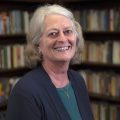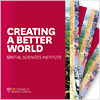kakemp@dornsife.usc.edu / (213) 740-5910 / AHF B55D
1992 Ph.D., Geography, University of California, Santa Barbara
1982 M.A., Geography, Resources, University of Victoria, Victoria, B.C., Canada
1976 B.Sc., First Class Honours, Physical Geography, University of Calgary, Calgary, Alberta, Canada
Karen K. Kemp is Professor Emerita of the Practice of Spatial Sciences in the Spatial Sciences Institute at the University of Southern California Dornsife College of Letters, Arts and Sciences.
Her scientific research has focused on developing methods to improve the integration of environmental models with GIS from both the pedagogic and scientific perspectives and on formalizing the conceptual models of space acquired by scientists and humanities scholars across a wide range of disciplines. Her teaching expertise is in spatial analysis, spatial modeling, and thesis advisement in the online GIST Graduate Programs.
Since the late 1980s, Kemp has been a major figure in the evolution of GIS education in the United States and abroad. In 1990, she co-edited the original National Center for Geographic Information and Analysis (NCGIA) Core Curriculum in GISystems and was part of the editorial and authorship team for the 2006 UCGIS Geographic Information Science and Technology Body of Knowledge. She was a founding member of the GIS Certification Institute (GISCI) Board of Directors and maintains her Geographic Information Science Professional (GISP) certification from that organization.
Kemp has been honored by the University Consortium for Geographic Information Science (UCGIS) as Educator of the Year in 2004 and as a UCGIS Fellow in 2011 “for her extraordinary record of accomplishment, service and contributions to the advancement of geographic information science and applications.” She served as president of UCGIS in 2019-2020.
Prior to joining the USC Spatial Sciences Institute, Kemp created and directed the University of Redlands M.S. in GIS program, and before that, was the executive director of the University of California Berkeley Geographic Information Science Center where she helped build the foundation for a campus-wide GIScience initiative. She also served as the associate director and assistant director for development of the NCGIA at the University of California, Santa Barbara.
Selected Works:
Kemp, K.K. In press. Convergence: GIScience turns to the Spatial Humanities. In David J. Bodenhamer, John Corrigan, and Trevor M. Harris (Eds.), Making Deep Maps: Foundations, Approaches, and Methods. Indiana University Press.
Kemp, K.K. and N.M. Waters. 2019. Goodchild, Michael F., Pioneer. In P. Atkinson, S. Delamont, A. Cernat, J.W. Sakshaug, & R.A. Williams (Eds.), SAGE Research Methods Foundations. URL: http://methods.sagepub.com/foundations. doi: 10.4135/9781526421036803097.
Wu, An-Min, and Karen Kemp. 2019. Global Measures of Spatial Association. The Geographic Information Science & Technology Body of Knowledge (1st Quarter 2019 Edition), John P. Wilson (Ed.). DOI: 10.22224/gistbok/2019.1.12.
Shook, Eric, Forrest J. Bowlick, Karen K. Kemp, Ola Ahlqvist, Patricia Carbajeles-Dale, David DiBiase, Eun-Kyeong Kim, Scott Lathrop, Britta Ricker, Patrick Rickles, Johnathan Rush, Jennifer N. Swift and Shaowen Wang. 2019. Cyber Literacy for GIScience: Toward Formalizing Geospatial Computing Education. The Professional Geographer, 71(2), 221-238. doi: 10.1080/00330124.2018.1518720.
Weidermann, C.D., J.N. Swift and K.K. Kemp. 2018. Geosocial Footprints and Concerns in Geoprivacy. In Jim Thatcher, Andy Shears and Joe Eckert (eds.), Thinking Big Data in Geography: New Regimes, New Research. University of Nebraska Press, pp. 123-144.
Kemp, K., Professional Certification. In J. Wilson (Ed.), The Geographic Information Science & Technology Body of Knowledge. University Consortium for Geographic Information Science, 3rd Quarter 2016 edition, doi: 10.22224/gistbok/2016.3.1.
Ferguson, W.J., Kemp, K.K. & Kost, G., Using a Geographic Information System to Enhance Patient Access to Point-of-care Diagnostics in a Limited-Resource Setting. International Journal of Health Geographics, 15, 10, 2016, doi: 10.1186/s12942-016-0037-9.



